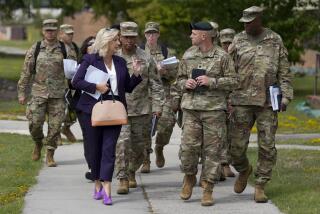Marines’ group effort to extend Iraq duty
- Share via
RAMADI, IRAQ — Marine Cpl. Saul Mellado could be back in California, finishing the final months of his enlistment in a safe billet at Camp Pendleton.
Instead, the 23-year-old naturalized U.S. citizen from Mexico is patrolling these war-torn streets only recently wrested from insurgent control -- and bracing for an expected counteroffensive.
Mellado, a machine-gunner, knows these streets: the adults who eye the Marines with suspicion and the children who beg for candy and water. He was first dispatched to Ramadi in late 2004, a deployment during which 15 Marines in his unit -- the 2nd Battalion, 5th Regiment -- died and more than 200 were wounded.
Under Marine Corps rules about “short-timers,” Mellado could have skipped this return to Ramadi six weeks ago. But like 200 other members of the battalion -- a quarter of its number -- he asked to have his enlistment extended. Unlike a reenlistment, the move earns the Marines no bonus money, no promotion and no promise of a job shift or posting to a favored duty station.
“For a lot of the guys, this is their first tour,” Mellado said as his Humvee moved slowly through the rubble-strewn streets. “If anything happened to them, and I could have helped them, I couldn’t stand that.”
Mellado’s wife, Kirsten, is pregnant with their first child, a boy. Mellado has no plans to take leave to see the birth, and it is unclear whether a webcam will be available so he can see the infant.
“I’m here so our sons don’t have to come here and fight someday,” he said.
In a teasing, sing-song voice, Lance Cpl. Abraham Saenz, 21, said: “He came out here to be with us. He just couldn’t stand to leave his boys behind.”
Officials say extensions are not uncommon among the Marine Corps’ 24 battalions, even as some return to Iraq for their third combat tour. In fact, they say, few records are kept because they are so common.
But Marine generals who review the manpower of all infantry battalions say the 200 from the Two-Five, the most decorated battalion in the Corps, make up the biggest group.
It can be traced to a meeting in Okinawa, Japan, several months ago when the battalion was finishing a phase of its pre-deployment training.
Lt. Col. Craig Kozeniesky, the battalion commander, and Sgt. Maj. William Jordan, the senior enlisted man, assembled Marines whose enlistments were running short. Marines who were there don’t remember that Kozeniesky or Jordan spent much time speaking of the complexities of U.S. foreign policy in the 21st century. Instead, the two asked the Marines to help the battalion’s younger members.
“I just told them: ‘We’ve been together this long. We need you -- the young Marines need you,’ ” Jordan said.
In an infantry battalion, a sergeant major serves as the embodiment of institutional values to younger “grunts.” At 44, Jordan has been in the Marine Corps for 27 years.
“Finally I just told them, ‘Everybody who is with us, move to the right side of the room,’ ” Jordan said. Only a handful stayed put. About 175 moved immediately to the right side.
“I was blown away,” Jordan said. “In all my years in the Marine Corps, I never saw anything like it.”
A decision to extend an enlistment meant putting plans on hold and finding an explanation for spouses and parents who would prefer that their Marines not return to Iraq. Sgt. Brian Kasher, 22, of Illinois plans to attend college, but he figures that can wait.
“I’m here to teach the younger guys,” he said. “My wife doesn’t like it, but she understands it.”
Once the battalion returned to Camp Pendleton, 25 more Marines, many of whom had not attended the Okinawa meeting, also agreed to extend their enlistments by several months to be part of the deployment.
For Mellado, the decision is connected to his status as an immigrant. “I came to America with 10 bucks in my pocket,” he said as he walked through a marketplace. “This is my way of paying back my country for all the good things it has done for me.”
The Two-Five, whose motto, “Retreat, Hell,” stems from the World War I battle at Belleau Wood, has drawn one of the tougher assignments in what remains the toughest city in sprawling Al Anbar province. Phone service is spotty, sewage runs in many streets, and any sign of local government is minimal.
But Marines say that residents, encouraged by tribal sheiks and imams, have turned against the extremists and, among other things, are pointing out the location of hidden roadside bombs.
“The last time, it was like the people didn’t want to do anything to help their neighborhoods,” Mellado said. “Now it’s a big change. I want to be here to help with that, to help my Marines.”
More to Read
Sign up for Essential California
The most important California stories and recommendations in your inbox every morning.
You may occasionally receive promotional content from the Los Angeles Times.












